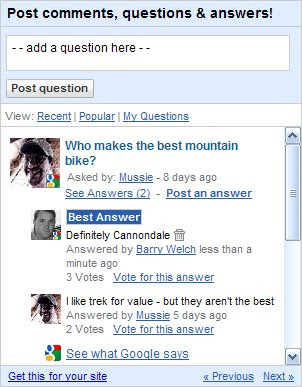With thousands of webmasters visiting the English Help Forum every day, some questions naturally pop up more often than others. To help catch these common issues, the Bionic Posters have also helped to create and maintain a comprehensive list of frequently asked questions and their answers. These FAQs cover everything from "Why isn't my site indexed?" to diagnosing difficult issues with the help of Google Webmaster Tools, often referring to our Webmaster Help Center for specific topics. Before you post in the forum, make sure you've read through these resources and do a quick search in the forum; chances are high that your question has been answered there already.
Besides the Bionic Posters, we're lucky to have a number of very active and helpful users in the forum, such as: squibble, Lysis, yasir, Steven Lockey, seo101, RickyD, MartinJ and many more. Thank you all for making this community so captivating and—most of the time—friendly.
Here are just a few (well, a little more than a few) of the many comments that we've seen posted in the forum:
- "Thank you for this forum... Thank you to those that take the time to answer and care!"
- "I've only posted one question here, but have received a wealth of knowledge by reading tons of posts and answers. The time you experts put into helping people with their problems is very inspiring and my hat's off to each of you. Anyway, I just wanted to let you know that your services aren't going unnoticed and I truly appreciate the lessons."
- "Thank you very much cristina, what you told me has done the trick. I really appriciate the help as this has been bugging me for a while now and I didn't know what was wrong."
- "thank you ssssssssssoooo much kaleh. "
- "OK, Phil Payne big thanks to You! I have made changes and maybe people are starting to find me in G! Thanks to Ashley, I've started to make exclusive and relevant content for people."
- "If anything, it has helped me reflect on the sites and projects of days gone by so as to see what I could have done better - so that I can deliver that much more and better results going forward. I've learned that some things I had done right, were spot on, and other issues could have been handled differently, as well as a host of technical information that I've stored away for future use. Bottom Line: this forum rocks and is incredibly helpful."
- "I asked a handful of questions, got GREAT help while doing a whole lot of lurking, and now I've got a site that rocks!! (...) Huge thanks to all the Top Contributors, and a very special mention to WEBADO, who helped me a TON with my .htaccess file."
- "Over the years of reading (and sometimes contributing) to this forum I think it has helped to remove many false assumptions and doubts over Google's ranking systems. Contrary to what many have said I verily believe Google can benefit small businesses. Keep up the good work. "
- "The forum members are awesome and are a most impressive bunch. Their contribution is immeasurable as it is huge. Not only have they helped Google in their success as a profitable business entity, but also helped webmasters both aspiring and experienced. There is also an engender(ment) of "family" or "belonging" in the group that has transcended the best and worst of times (Current forum change still TBD :-) ). We can agree, disagree and agree to disagree but remain respectful and civil (Usually :-) )."
- "Hi Redleg, Thank you very much for all of the information. Without your help, I don't think I would ever have known how to find the problem. "
- "What an amazing board. Over the last few days I have asked 1 question and recieved a ton of advice mainly from Autocrat. "
- "A big thank you to the forum and the contributors that helped me get my site on Google . After some hassle with my web hosters and their naff submission service, issues over adding pages Google can see, issues over Sitemaps, I can now say that when I put my site name into the search and when i put in [custom made watch box], for instance, my site now comes up."
- "Thank you Autocrat! You are MAGNIFICENT! (...) I am your biggest fan today. : ) Imagine Joe Cocker singing With a Little Help from My Friends...that's my theme song today."
- "I've done a lot of reading since then and I've learned more in the last year than I learned in the previous 10. When I stumbled into this forum I had no idea what I was getting into but finding this forum was a gift from God! Words cannot express the amount of gratitude I feel for the help you have given me and I wish I could repay you some how.... I don't mean to sound so mushy, but I write this with tears in my eyes and I am truly, truly grateful..."
Are you new to the Webmaster Help Forum? Tell us a little bit about yourself and then join us to learn more and help others!
















